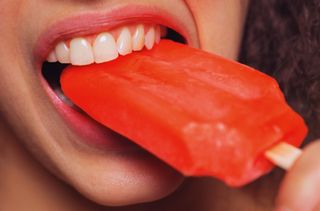Cavity Feeling Sensitive to Cold Again
Tooth sensitivity: Causes and remedies

For people with tooth sensitivity, eating or drinking sure substances or those at certain temperatures causes discomfort or hurting in their teeth. At least 40 million adults suffer from sensitive teeth in the United States, according to the Academy of General Dentistry.
The pain is oftentimes sharp and sudden, but it is temporary. Molar pain occurs when stimuli, such equally hot and cold, accomplish a molar's exposed nerve endings, according to the Cleveland Clinic. Fortunately, sensitive teeth can be treated, and the status can improve.
Causes of tooth sensitivity
At that place are no at-risk groups for tooth sensitivity. It can happen to anyone, co-ordinate to Dr. Margaret Culotta-Norton, a dentist in Washington, D.C. and former president of the D.C. Dental Gild.
"The most common symptom … is a sudden, abrupt wink of pain when teeth are exposed to air, cold, sweet, acidic or hot foods," Culotta-Norton told Live Scientific discipline. Some people may as well experience tooth sensitivity from brushing or flossing their teeth.
Tooth sensitivity generally results from a layer of the tooth chosen dentin being exposed. The outside of each tooth is normally covered by a hard outer layer, chosen enamel or cementum, which protects that dentin — the softer, inner layer of the tooth. Enamel protects the crown, the part of the tooth that's visible in a higher place the gum. Cementum covers the dentin surrounding the root, the pointy part of the molar that extends into the jaw bone, according to the American Dental Association. The gum besides protects the root. If the enamel or cementum gets worn downwardly or if the glue line has receded, then the dentin becomes exposed. "Cavities, croaky teeth, gum recession, enamel and root erosion all cause dentin to exist exposed," Culotta-Norton said. "Dentin is connected to the nervus that triggers pain in sensitive teeth."
Dentin contains thousands of microscopic tubules, or channels, leading to the tooth'southward pulp, co-ordinate to the University of General Dentistry. When exposed, these dentinal tubules allow oestrus, cold or acidic substances to reach the fretfulness inside the molar, causing pain, according to the Cleveland Clinic. Pain is the only type of response that the nerves within teeth accept, Alive Science previously reported.
According to the Cleveland Clinic, some factors that contribute to sensitive teeth may include:
- Brushing too difficult or using a hard-bristled toothbrush. This can habiliment down enamel, causing dentin to become exposed, or encourage gum recession.
- Mucilage recession. This frequently happens in people suffering from glue disease, including gingivitis. Gum recession exposes the dentin.
- Cracked teeth. Cracks can become filled with bacteria from plaque and cause inflammation in the lurid of the tooth. In more severe cases, it may pb to abscess and infection.
- Teeth grinding or clenching. This can wear downwards enamel.
- Plaque buildup.
- Long-term use of mouthwash. Some over-the-counter mouthwashes contain acids. If dentin is exposed, the acids can worsen existing tooth sensitivity and further impairment the dentin layer. There are neutral fluoride mouthwashes bachelor that might be a better selection.
- Acidic foods. These can encourage enamel reduction.
- Dental procedures. Teeth may exist sensitive subsequently professional cleaning, root planing, crown replacement and other procedures. Usually the pain volition disappear in iv to half dozen weeks.
Tooth sensitivity afterwards a filing
Some people may experience tooth sensitivity later having a cavity filled, according to the Cleveland Clinic. Fortunately, tooth sensitivity following a filling should amend on its ain within a few weeks.
Sometimes teeth become sensitive when biting downwards after a filling. This can happen because the filling is likewise loftier and prevents your lesser and summit teeth from fitting together properly. In this case, the dentist may need to reshape the filling. If you go a metal filling and it touches another blazon of metal, such as a gold or argent crown, when you bite downwardly, the contact betwixt the 2 different metals may cause some pain initially, simply it should subside.
If you have toothache-like hurting afterward a filling and it doesn't go abroad, the interior of the tooth, chosen the pulp, may be severely inflamed. This inflammation is called pulpitis, co-ordinate to the Merck Manual. If the inflammation is so severe that the pulp becomes necrotic, or starts to die, it may require a root canal, in which the damaged tissue is replaced with a filling of a rubber-like substance chosen gutta-percha or another material, co-ordinate to the Academy of Full general Dentistry.
Tooth sensitivity later on whitening treatments
Teeth-whitening treatments — done either in a dentist's office or using an over-the-counter product — contain harsh chemicals (hydrogen peroxide or carbamide peroxide) that remove stains, but they can likewise crusade tooth sensitivity. When peroxide penetrates the enamel, information technology can temporarily irritate the tooth. Overuse of whiteners can also damage the enamel and gums, according to the American Dental Clan.
Several studies have investigated ways to lessen pain after dentist-performed teeth-whitening treatments. A 2018 study in the periodical Operative Dentistry found that patients taking acetaminophen/codeine before treatment did not reduce pain. A 2016 study in the journal Lasers in Medical Scientific discipline establish that irradiating teeth with low-level lasers later a whitening handling reduced pain levels significantly compared with patients who did not receive any laser treatment. And a 2018 study published in The Journal of the American Dental Association constitute that applying a desensitizing gel before whitening significantly reduced tooth sensitivity after treatment.
Another potential solution is changing the formula of whitening products. A 2017 report published in the journal Clinical Oral Investigations constitute that reducing the acerbity in bleaching gels resulted in significantly less hurting with the same whitening results.
Tooth sensitivity treatment
"Sensitive teeth never completely disappear," Culotta-Norton said. "Symptoms may be less or even seem to go away for a while, but unless the reasons why a person's teeth become sensitive are completely eliminated the sensitivity will come and go."
There are several types of treatment bachelor, and each dentist has his or her favorites that they are near likely to recommend, according to Culotta-Norton. She stressed that in that location is no unmarried handling pick that works for everyone. "Proper diagnosis of the reason for the sensitivity is essential in treating sensitivity. If the reason for the sensitivity is addressed, the handling chosen will be more successful in decreasing pain. If the dentist just treats sensitivity without addressing the reason for it the problem will go along and get worse," she said.
The following are some at-home treatments suggested past the Cleveland Clinic:
- Desensitizing toothpaste. In that location are several brands of toothpaste for sensitive teeth that are available. Your dentist may recommend one, or y'all may accept to endeavor different brands until you notice the product that works for you. Be sure to use fluoridated toothpaste for sensitive teeth, not tartar-command toothpaste. Try spreading a sparse layer of desensitizing toothpaste on the exposed tooth roots before bed.
- Apply a soft-bristled toothbrush.
- Avoid highly acidic foods.
- Use a fluoridated mouthwash daily.
- Avoid teeth grinding. Consider getting a mouth guard.
The following are some dental procedures that may reduce molar sensitivity, according to the American Dental Association:
- Bonding, crowns or inlays. These may fix a molar flaw or disuse that is causing sensitivity.
- Fluoride gel.
- Surgical gum graft. This will protect the root and reduce sensitivity if the gum tissue has eroded from the root.
- Root canal. This is a concluding-resort handling for severe molar sensitivity that has not been helped by other methods.

Fluoride treatment for sensitive teeth
A review article published in 2015 in the periodical Caries Research suggests that fluoride lone can't prevent tooth erosion, which can lead to tooth sensitivity. The authors suggest that treatments combining fluoride with polyvalent metal ions and some polymers may offer more protection. The authors said that more studies were needed to determine the efficacy of these additives.
In 2014, the FDA canonical the employ of silver diamine fluoride (SDF) to care for tooth sensitivity, according to the Association of Country and Territorial Dental Directors (ASTDD), a national oral health nonprofit. The topical treatment has long been popular in Asia and Europe and used to prevent pain and caries. A short-term 2011 clinical trial in Peru published in the Journal of Dental Research found that participants with tooth sensitivity who underwent topical SDF applications experienced significantly reduced levels of pain. The application of SDF results in a harder molar surface, helping to forestall further decay. Information technology also protects exposed dentin from potentially painful stimuli by partially blocking the dentinal tubules, according to a University of California San Francisco protocol for using SDF to care for cavities, published in the Journal of the California Dental Clan.
Silvery diamine fluoride treatments must be practical by a dental practitioner, according to the ASTDD. When applied over spots of demineralized (damaged) enamel or dentin, silver diamine fluoride results in a permanent black spot on the tooth. Information technology does not stain good for you teeth, however. Silver diamine fluoride treatments arose out of the Japanese exercise of tooth blackening, called ohaguro, in the 19th century, according to the journal Oral Science. People with silver allergies should not apply this treatment.
This article was updated on May 18, 2021 by Alive Scientific discipline contributor Ashley P. Taylor.
Source: https://www.livescience.com/44377-sensitive-teeth.html
0 Response to "Cavity Feeling Sensitive to Cold Again"
Post a Comment